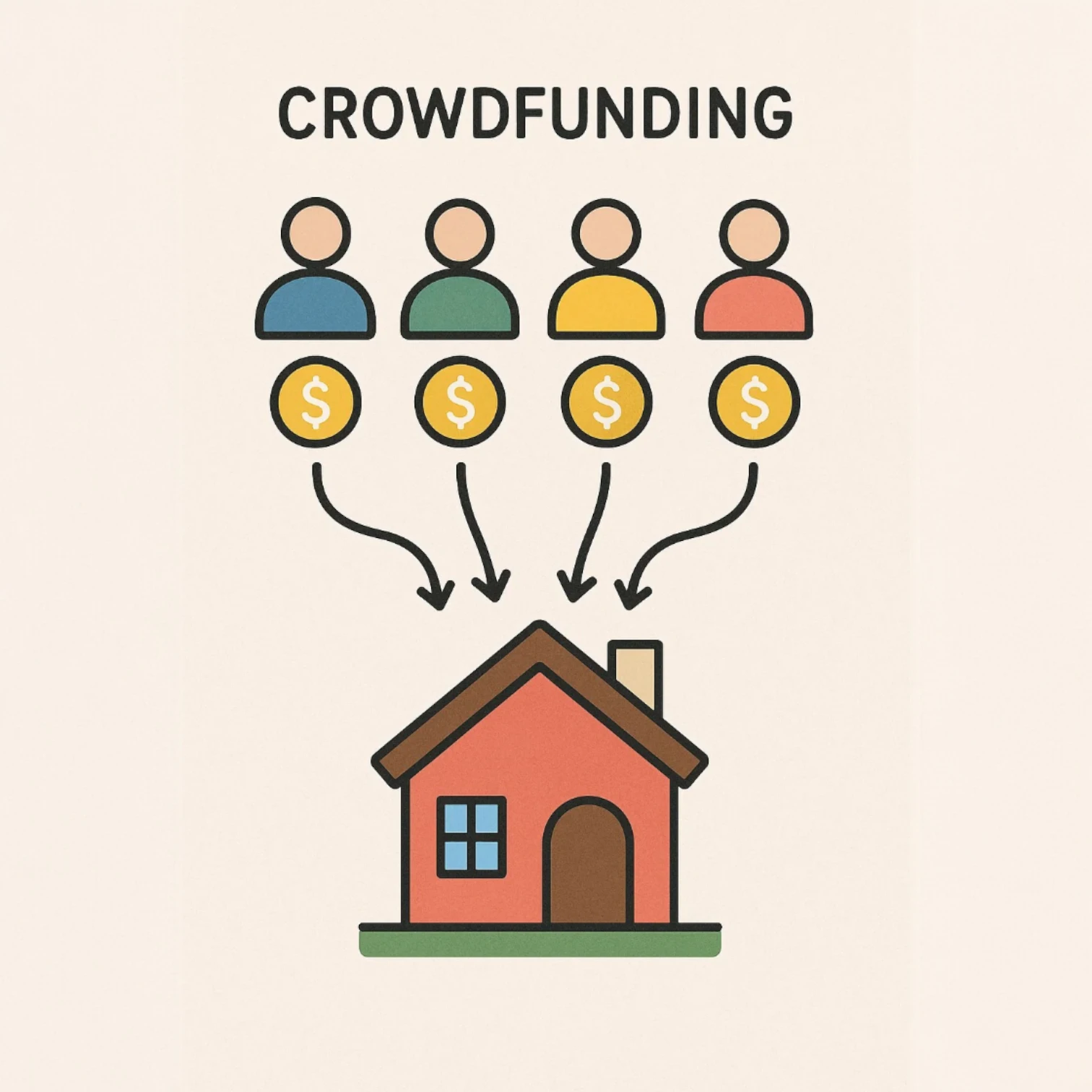The UAE’s property landscape has gone through a noticeable shift. For a long time, getting into real estate here meant needing a lot of capital and, in many cases, connections. But that’s changing. With the rise of licensed crowdfunding platforms and a more flexible investment model, people now have a way to enter the market without having to buy a full property on their own.
This setup allows multiple investors to contribute smaller amounts toward the purchase of high-value properties—residential or commercial. In return, they each get a share of the returns, whether that’s rental income or gains from a future sale. Some platforms let you start with as little as AED 1,000, which puts ownership of premium UAE real estate within reach for a much wider group of people.
Real estate crowdfunding doesn’t replace traditional ownership, but it gives you an alternative, one that’s passive, lower-risk, and managed professionally. And because the platforms are regulated, there are safeguards in place to protect your money and keep the process transparent from start to finish.
If you’re looking for a way to build long-term wealth through real estate, and want something more flexible than buying a unit outright, this model might be worth a closer look.
Understanding Real Estate Crowdfunding in the UAE

In simple terms, real estate crowdfunding gives you a way to invest in property without having to buy the whole thing yourself. Instead, a group of investors, maybe dozens or even hundreds, pool their money together to purchase a property, and each one owns a small portion.
You won’t be getting the keys to a front door, but your name will still be tied to the investment. That’s because your share is recorded through a structure set up specifically for this purpose.
Once a property is fully funded, the platform usually forms a Special Purpose Vehicle, often called an SPV. This legal entity is what actually holds the property title.
All of this happens through platforms that are regulated locally. In the UAE, that means oversight from authorities like the Dubai Land Department or the DFSA, depending on where the platform is based. So while you may never set foot in the unit, your share and your rights are protected.
What makes this model appealing for a lot of people is how hands-off it is. You’re not the one dealing with tenants, calling plumbers, or collecting rent checks. The platform does all of that. Your job, really, is to choose the property, make the investment, and track how it performs. Everything else runs in the background.
How the Crowdfunding Process Works
- Platform Onboarding
You begin by signing up on a regulated real estate crowdfunding platform. This includes submitting your identity and financial documentation for KYC and AML compliance. The platform will also assess your risk profile to match you with suitable investments. - Property Listings and Investment
Once approved, you can browse investment opportunities across different asset types, luxury villas, branded residences, commercial towers, and more. Each listing includes a detailed breakdown of the property, rental yield projections, location analytics, and legal documents. - Special Purpose Vehicle (SPV) Formation
When enough capital is raised, the platform sets up an SPV to purchase the property. This legal entity holds the title, ensuring transparency and safeguarding your ownership rights. - Returns and Portfolio Management
As a shareholder in the SPV, you’ll receive quarterly or annual income distributions, depending on the platform’s model. You’ll also be able to monitor your portfolio’s performance through a dashboard showing earnings, occupancy rates, and property value trends. - Exit Options
Some platforms offer secondary markets where you can resell your shares before the investment term ends, giving you greater flexibility than traditional real estate investing.
Key Benefits of Crowdfunded Real Estate in the UAE

- Lower Entry Point: Buying into Dubai’s real estate scene used to mean setting aside a large chunk of money. For most people, that just wasn’t realistic. But crowdfunding changes that. You don’t need to come in with hundreds of thousands, some platforms let you start with just a few thousand dirhams. It’s a way to get in early, even if your budget is modest, and gradually grow your exposure as you go.
- Portfolio Diversification: Instead of putting all your money into one unit in one location, this model lets you spread things out. You could have a small share in a luxury apartment downtown, part of a commercial property near the marina, and maybe even a short-term rental somewhere more tourist-focused. That kind of variety helps reduce risk if one sector or area cools down.
- Professional Oversight: You don’t need to be a landlord, and you won’t be managing tenants or chasing rent. That’s handled by the platform, along with property maintenance, legal paperwork, and financial reporting. It’s a passive setup, which makes it a lot easier to stay invested without turning it into a second job.
- Regulatory Safeguards: Since platforms are licensed and work under UAE regulations, you’re not just handing over your money blindly. There are rules in place, around transparency, data, and reporting, that are meant to keep things fair and clear. You’ll get updates on performance and know exactly where your money’s tied up.
- Improved Liquidity: Traditional real estate often means waiting years for a sale before you see any returns. Some crowdfunding platforms now give you an option to exit earlier by selling your shares to another investor. It’s not guaranteed or instant, but it’s a welcome option if you want more flexibility with your timeline.
Legal and Regulatory Considerations
Real estate crowdfunding in the UAE operates under a robust legal framework:
- Platform Licensing: All platforms must be licensed by the DFSA or similar bodies and undergo regular audits.
- Escrow and SPV Use: Your funds go into escrow and are only released once the investment target is met. The SPV model ensures your share of ownership is clearly defined.
- Ongoing Reporting: Platforms are required to provide regular updates on investment performance, financials, and property health.
This framework ensures that your interests as an investor are protected while supporting a transparent market environment.
The Future of Real Estate Crowdfunding in the UAE
The sector is evolving rapidly, with three key trends driving growth:
- Smart Technology Integration: Platforms are leveraging AI, blockchain, and predictive analytics to identify high-performing properties, automate operations, and enhance transparency.
- Wider Market Access: The UAE is attracting more international investors seeking exposure to high-yielding Middle Eastern assets. As a result, crowdfunding platforms are expanding their portfolios across Dubai, Abu Dhabi, Sharjah, and Ras Al Khaimah.
- Regulatory Innovation: Authorities are actively updating policies to encourage fintech innovation while ensuring investor security. Expect new frameworks that support tokenization, secondary markets, and cross-border investing.
Getting Started with Real Estate Crowdfunding

Thinking about getting into real estate crowdfunding? Start by checking out a few platforms, not just the first one you see. You’ll want to make sure they’re licensed to operate in the UAE, of course, but also take a look at how long they’ve been around. If a platform’s been through a few market cycles and still going strong, that usually tells you something..
A solid track record goes a long way in giving you peace of mind before you commit your money. Dig into how they work, how transparent their fee structure is, and whether the dashboard makes it easy for you to keep an eye on your money.
What you’re doing here isn’t just buying into a property, it’s positioning yourself to earn from one of the most active real estate markets in the region. The added benefit? You’re doing it without the typical headaches that come with being a landlord.
And since many of these platforms are designed to make onboarding easy, your entry point might be lower than you expect. With the right research and a bit of planning, you could be just a few clicks away from starting your first investment and laying the groundwork for longer-term growth.